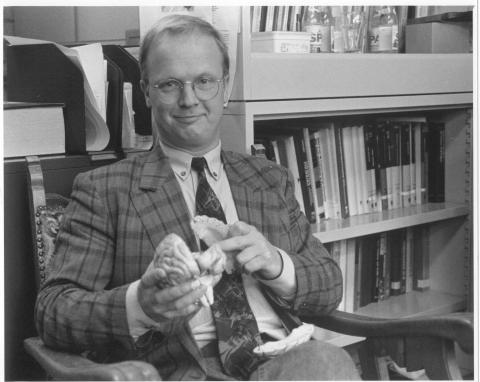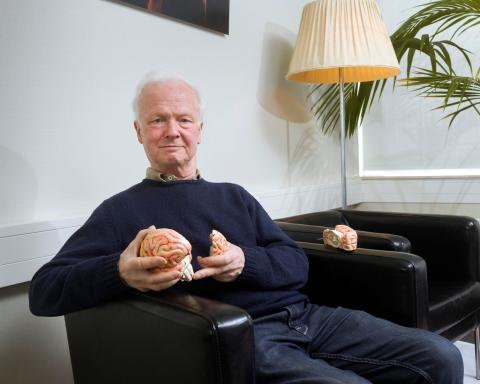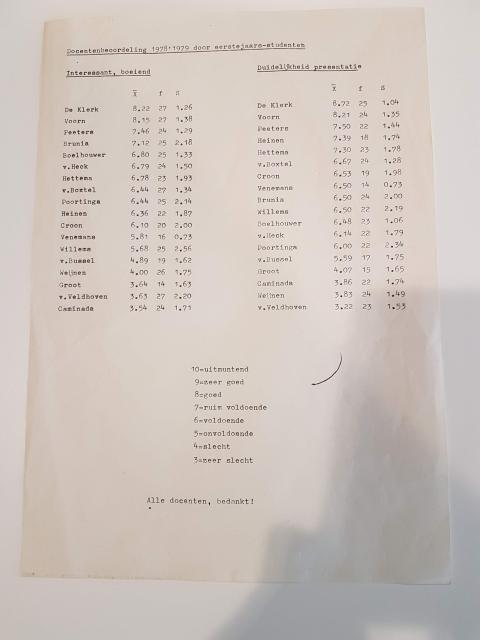50 years of psychology: "Returning to Tilburg was a very good decision."
Half a century ago, Tilburg was enriched by the field of psychology. A then still unexplored area in Tilburg that offered every opportunity for pioneering. Many of the people who were involved at the beginning have never left. Ton van Boxtel is one of them. For 50 years he was active as an associate professor and researcher at Tilburg University. "I was born and raised in Tilburg, left and actually never planned to return. But things turned out differently," Ton laughs. "This anniversary brought back a lot of memories. A lot has happened since the early days. But then again, nothing essential has changed."


Pictured is Ton van Boxtel with the same brain model he held in 1985.
Brain model
"It dates back to about 1890. I am an avid admirer of antiquarian work. I found this model in the trash of Utrecht University! Whether it is anatomically correct? Certainly it is, in the 19th century people already knew as much, or more, about the anatomy of human brains as they do today. All these years, we as humans have certainly not changed. In fact, the ins and outs of Tilburg University actually haven’t changed that much either.”
Then...
Ton was studying what was then called 'Experimental Psychology in Utrecht, when he was asked to come and work in Tilburg. Despite his intention not to return to his hometown, he seized the opportunity: "It was the right decision. It was 1971 and there was nothing here yet. We had all the freedom to decide which subjects to teach. And how we would do this. As far as I was concerned, those were golden times."
The small scale and intimacy of the early days allowed psychology to flourish in Tilburg. Ton outlines an atmosphere of pioneering, invention, togetherness and intimacy. "There were few students in the beginning, so everyone knew each other well. Moreover, the study in Tilburg gave young professionals with a family the opportunity to go to university nearby. The difference in age and life experience between students and teachers was therefore very small in those days. That strengthened the bond. We really did it together."
And now...
Many old-timers agree: the early days were exciting, with freedom and unbridled creativity in a friendly and pleasant atmosphere. But gradually the faculty grew. There were cutbacks and financial crises to overcome. And more and more students came, which inevitably led to less intensive and personal contacts. The growth also brought more rules and procedures ‘from above’. "For the old guard the bureaucracy was often a hard pill to swallow," Ton memorizes. "My strategy for dealing with that was to go with the flow. I never said no, but I did do my homework. I made an effort to understand the consequences of rules and policy. So if I was critical, they listened to me. That way I felt I was always able to do my own thing anyway."
Nose piercings
This extra effort turns out to be characteristic of Ton. He also often went the extra mile in his teaching and dealings with students. "As a result, I've actually never had any complaints. I've always enjoyed doing my job." Up to nine years after his retirement, Ton taught the bachelor course Introduction to Clinical Neuropsychology. "As of this academic year (2021-2022) I definitely stopped. It is a fantastic course, which got an extra boost since we also start to offer it in English. The international students are an experience in themselves. And not just because of their tattoos and nose piercings. They are extremely enthusiastic, involved and interested and bring a lot of personal life experience with them. It is no coincidence that some talented Dutch students want to study in English. It gives extra workload to offer a course bilingually, but introducing bilingual courses has really been a good decision by our university."
Recognition
One thing Ton would like to add is a critical note about teacher appreciation and, in particular, course evaluations. "There are too many biases in that. The moment of doing the survey is one of them. But also: does a teacher teach a popular subject? And do you have a personal click with the teacher? All of this plays into it, so you can't objectively judge whether someone is a good teacher based on such an evaluation."

"Long ago, the first evaluations were initiated and conducted by the students themselves. That produced a list of good and not so well rated teachers. From this it became clear that you do not have to be a good teacher to make a career within the university. As far as the latter is concerned, it is primarily about money. Large grants and academic merit still give the most chance of permanent employment. As a result, we have lost a number of great teaching talents. Fortunately, almost all of them ended up well, but what have we lost as a result? The Recognition and Rewards program is an interesting development. It would be good if that really took off, so that very good teachers would also get the chance to make a name for themselves and move up the ranks. But honestly: I have yet to see that."
About Ton van Boxtel
Ton van Boxtel (1947) was Associate Professor of Cognitive Neuropsychology at Tilburg University until the 2021-2022 academic year. He specializes in basic functions such as perception, cognitive processes, and the meaning of facial expressions. Currently he is working with researchers at Utrecht University on research in children with severe antisocial behavioral problems. This research has shown, among other things, that psychopathy is a disorder of the brain that makes people unable to interpret other people's emotional facial expressions and therefore unable to empathize with others. "Empathy is an important part of living together in a group. And so is aggression, unfortunately. It's part of us, just like it's part of our ancestors and distant cousins (the great apes). It's important to understand that and learn from it what that means for us as individuals and for our society."
Date of publication: 11 April 2022
